The 6 Best Password Management Tools
Everyone in the 21st century has a large number of accounts they’ve created across a number of sites. Those of us involved in cryptocurrencies might even have more than the average person since we need passwords for all our exchange accounts, wallets, financial service providers, in addition to all the other usual accounts. No one can possibly remember all these passwords, and using the same password across multiple sites is a security risk no one should be taking.
Even losing access to your social media accounts could be quite upsetting, but imagine if bad actors got access to the passwords you use for your wallets or exchanges. That could be a tragedy!
Managing all those passwords manually is certainly a possibility, but its time consuming. Plus having a document with all your passwords on your computer, or even as a hard copy on paper, is less than secure. That’s why more and more people are turning to password management tools to help. And as you’ll find out, some of these tools have other benefits aside from simply storing your passwords.
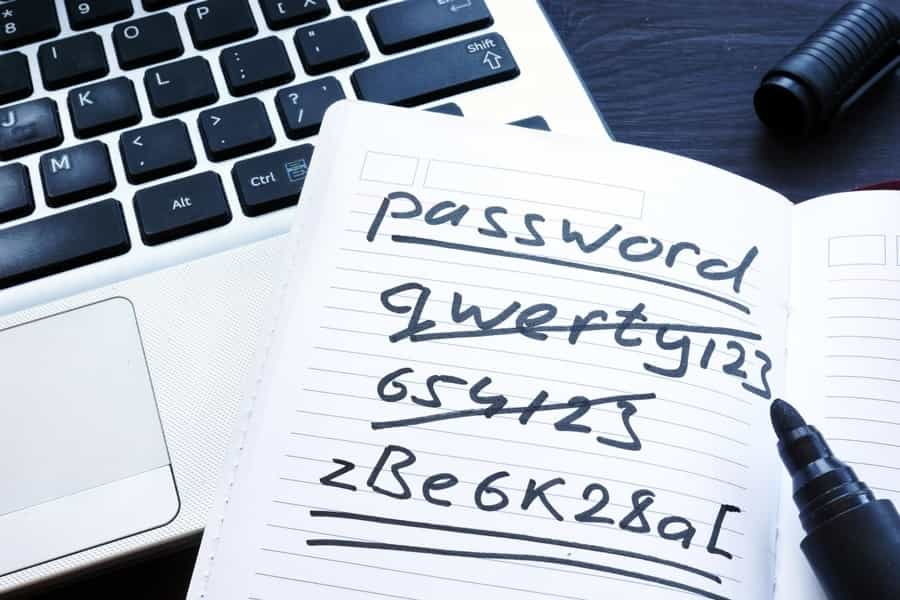
In the following guide you can learn all the potential benefits of a password management tool, and which tools available in 2021 are best for your needs.
What is a Password Manager?
As I already mentioned above, it’s not advisable to use the same, or even similar, passwords across all your accounts. But it’s virtually impossible for anyone to remember all the different passwords they need to secure all the different online accounts they have. Compounding the issue is that some sites will lock you out if you type in an incorrect password too many times. And some wallets and other crypto tools have no password recovery feature, making it impossible to get into those accounts if you ever lose or forget your password.
Password management tools come to the rescue by storing passwords so that users can easily access them, even across multiple devices. Password managers come as both desktop and mobile applications, and in both cases they store your login information, and when you navigate to a website that requires a login they will automatically fill in the details based on the stored information.
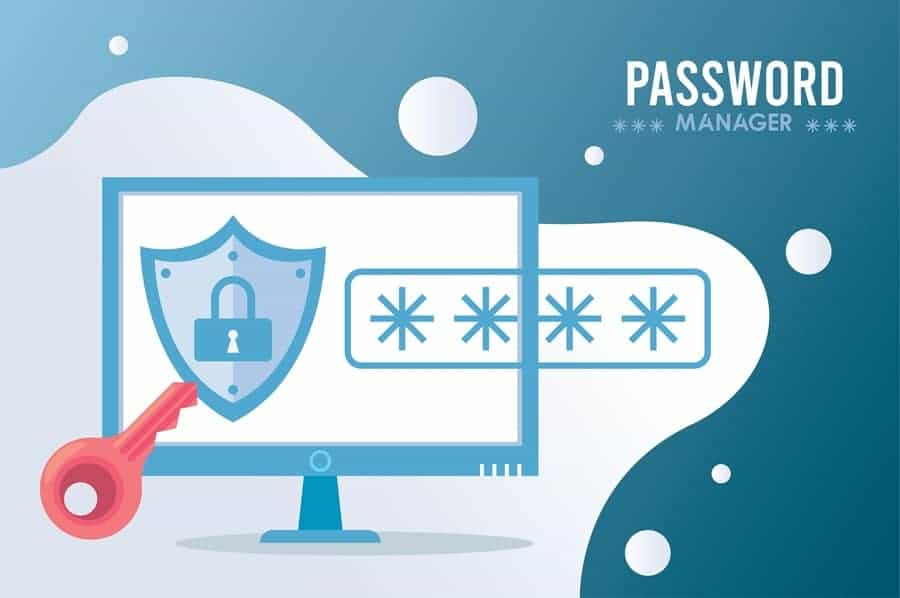
There are two major benefits to this. The obvious benefit is that the password manager software makes it unnecessary for you to remember all of your passwords. You are freed up to set passwords that are extremely complex and random, and not have to worry that you’ll later forget the password. The second benefit is that since you don’t need to manually type the password (or username) into any form there’s no way for keyloggers or other malicious software to spy on you.
Password Management Security Risks
I know at this point you’re probably thinking that trusting your passwords to a third party is going to be dangerous as well. However the login information and any personal details stored by password management tools are encrypted and stored locally on your hardware, or securely via cloud storage.
Access to the password management tool itself is controlled through a Master Password. This is the password used to access all the other passwords, and without it they are inaccessible and unable to be decrypted. The only person who has the Master Password is the application user. So even if hackers were able to get into the central servers of the password management company, they would still be unable to access any of the passwords stored by users.
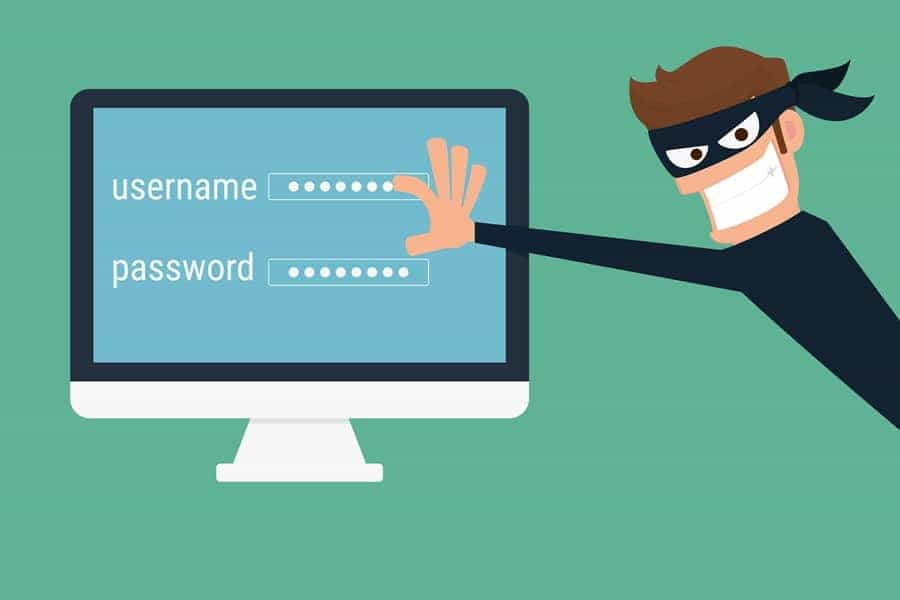
In addition, the Master Password is useless by itself. This is similar to the way 2-factor authentication requires an external verification to permit access to an account.
So basically while there is of course some degree of risk in using a password manager, there’s just as much or more risk in storing your own passwords either physically or digitally on your computer.
Why Use a Password Manager?
The best password management tools will sync between multiple devices. This makes the current generation of password managers far more efficient and useful than past generations. With this feature you are able to easily access your accounts from any of your devices, whether at home, at work, or on your mobile device.
The tool is also a time saver, since you’re no longer required to type your login information every time you need to access an account. While this might not seem a big deal for each individual login, when you combine all the times you log in to various accounts in the course of a month this can add up to some serious time savings.
The best tools also feature encryption to secure your data. So, let’s have a look at which password management tools are best in 2021.
1. LastPass
LastPass is considered to be the gold standard in password management tools by many people. It’s certainly one of the most recognizable brands in the space, and is one of the most widely used password management tools. In fact, you’ll be hard pressed to find another password manager with a reputation better than LastPass. But does that mean it’s the best?
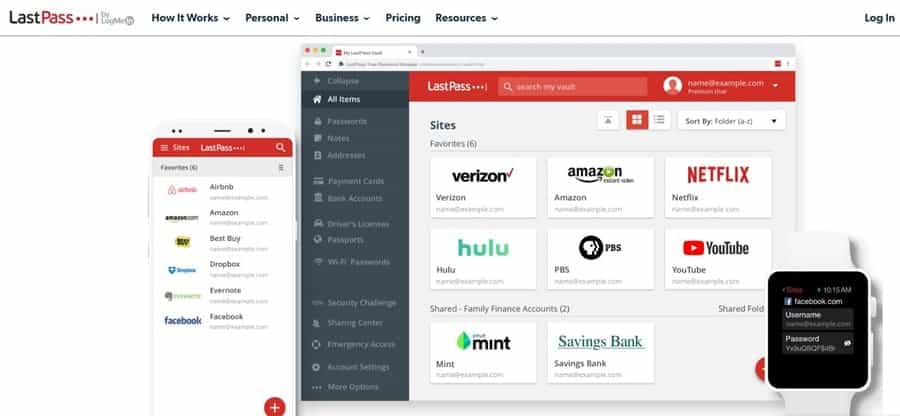
The truth of the matter is that users seem to be deeply divided with this product. Once you sign up and begin using LastPass it seems like you’ll either love it, or you’ll hate it. There’s little middle ground among users. It’s kind of like the Apple of password management.
As LastPass became increasingly popular it also faced an increasing amount of competition. That hasn’t stopped users of LastPass from hanging onto their free accounts because they love the platform. Even the paid accounts run just $36 a year, or $3 a month, and the paid version comes with a number of add-ons. But even without the add-ons the basic account has so much included. Most importantly, it will store all your passwords across multiple platforms and devices. It’s a perfect solution for both personal use and business use.
Not only can you store basic account passwords with LastPass, you can also store Wi-Fi passwords and digital records of important documents like your passport or membership contracts, and share them with others easily.
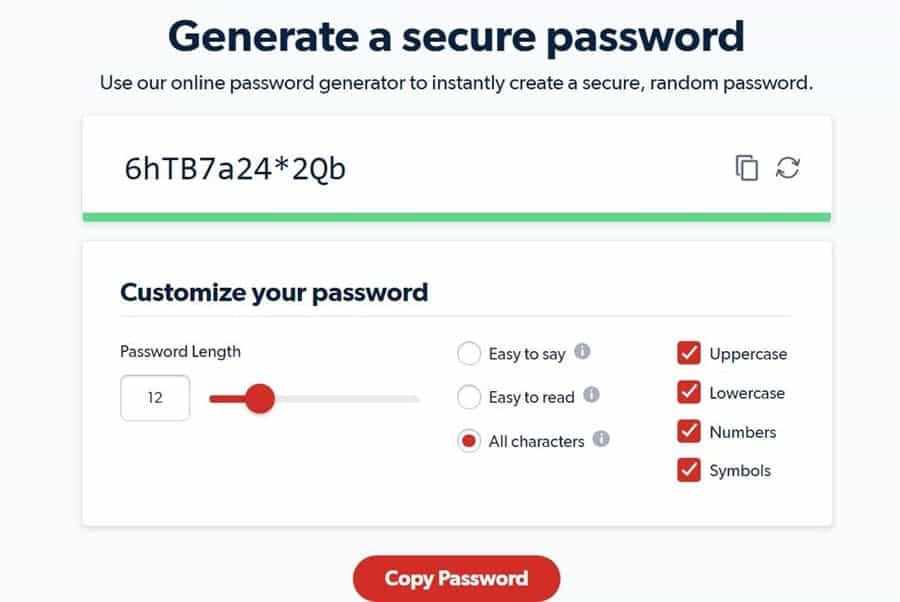
LastPass has its own built-in password generator, which can create long, complex, randomized passwords to thwart hackers. And while it does have standalone apps for Windows and MacOS devices, it is most frequently used as a web browser extension. Plus there are situations where you can even use it offline.
The lynchpin to the functionality of LastPass is the Master Password. This one, single password secures the LastPass vault, keeping all other passwords encrypted and secure. Having this Master Password makes life so much easier than having to remember dozens of passwords. You can use the Master Password to access your LastPass password vault online with a browser extension, through the mobile app on your mobile device, or if you’re a premium user through the Windows desktop app. The stored data will be used to automatically fill in the login forms or you can access the passwords to copy/paste whenever needed.
Another great feature of LastPass is its multifactor authentication. This added layer of security requires you to enter a code delivered via the LastPass MFA app. The app supports 6-digit generated passcodes, SMS codes, and automated push notifications for one-tap login. Multifactor authentication adds another layer of security to the password management tool, and keeps your Lastpass account secure from hackers, keyloggers, data breaches, and other online threats.
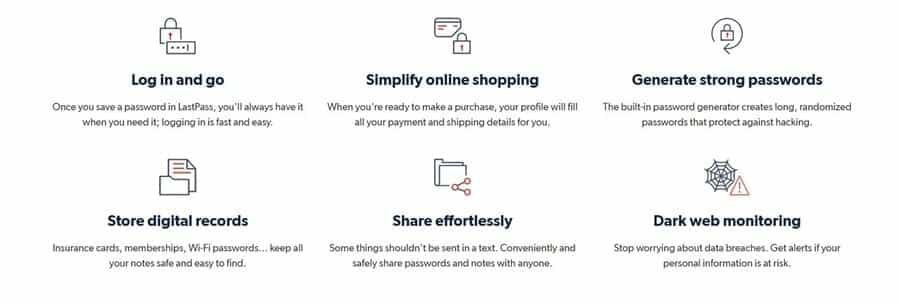
Added security comes from the Dark Web monitor included with each paid LastPass account. Simply turn on monitoring for all the email addresses you want LastPass to keep an eye on. Then any time a monitored address is detected in the database of breached credentials you’ll receive an email from LastPass letting you know about it. Finally, take action to protect any account compromised in a breach. Change your password to ensure peace of mind.
According to the LastPass website there are more than 25 million users of its password management tool, with roughly 70,000 of them being businesses. LastPass has a number of features that allow managers to customize the app for their particular business needs. This flexibility is likely part of the reason for the strong adoption of LastPass, along with the support for so many devices.

If all this sounds good to you then give LastPass a try with their free account level. You might find that you love the service, or you might find it isn’t really right for you. Either way you won’t know for sure until you give it a try.
2. Dashlane
Dashlane comes with a basic free password management tool that anyone can use, but like the other password managers it also has several tiers of paid, premium account options that are definitely worth paying a little bit extra. The bonus features in these paid tiers are excellent additions.
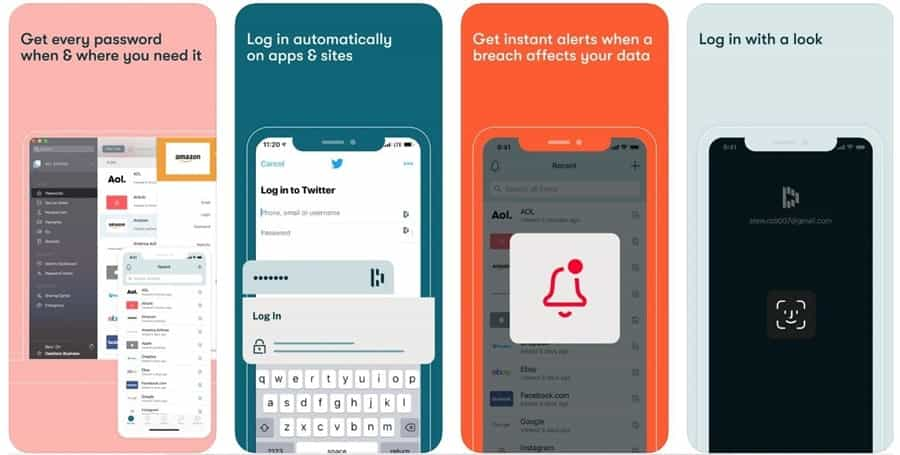
That said, the free version is still a great choice if you are only looking for the basic login and payment autofill capabilities, along with two-factor authentication. The downsides to the free plan are a limit on the number of passwords you can store – 50 – and the restriction of only allowing one device.
However by upgrading to one of the premium accounts (starts at $2.99/mo) you also upgrade your password storage to infinite, and you can then synch all those passwords across multiple devices. And there’s more too.
Dashlane is the industry leader in password security, and it has a number of patents to prove that this is the case. Paid members get access to dark web monitoring that alerts regarding potential online hacks and data breaches. And Dashlane will also give them guided steps on how to take action when a hack or breach does occur.

Dashlane is also unique in offering a secure VPN feature. This is an excellent addition to the service in terms of privacy, and is also helpful for those who often find themselves connected to public Wi-Fi hotspots.
Users will also be glad to see that one of the main tenets of the Dashlane firm is a commitment to privacy. The company is fully transparent in that they do not share any of their customer’s data. And in terms of storage there’s nothing for them to see, even if they wanted to.

And Dashlane has a reputation within the industry as being one of the best password management tools due to the combination of powerful security and a simple user interface. It’s a top choice for those new to password management and private storage services. If you are new to this type of service then Dashlane might be a good place to start.
3. KeePass
If the best in security and a solid reputation are high on your list of requirements for a password management tool, then KeePass is definitely worth your time. While the website looks like it was made in decades past, the software is cutting edge for the 21st century. That’s why so many people have made it their go-to password manager and storage solution.
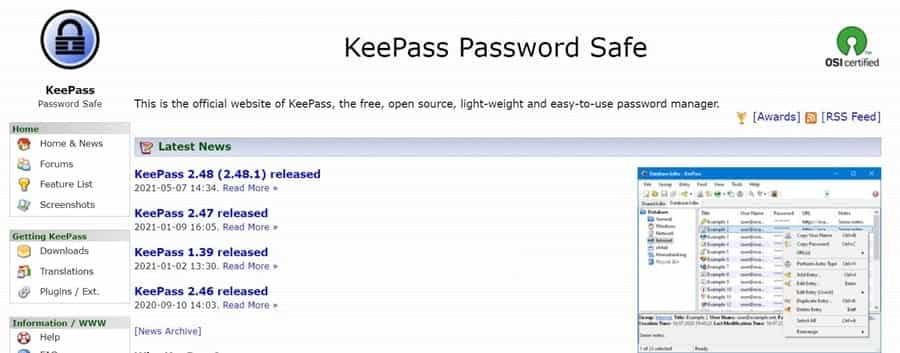
One thing you will find with KeePass is that just like its competitor LastPass, it seems to be extremely polarizing. In reviews users either love it and can’t live without it, or they really despise it. Chances are if what you want is a simple, solid, no-frills way to store passwords and other data you’ll really appreciate what KeePass has to offer.
And simple doesn’t mean there isn’t something special to offer from KeePass. Users who are trying to avoid cloud-based solutions will really appreciate the customizable, offline approach of KeePass for password management.
KeePass comes with a randomized password generator, an extensive plug-in architecture, and support for a number of languages. Another nice feature is the portability of KeePass, which allows it to be carried on a USD stick and run on Windows systems without being installed.

While the website for KeePass looks outdated, the actual product has frequent updates and uses all the best modern encryption and security to keep your passwords secure. And the simplicity seen on the website is mirrored in the simplicity of the product itself, making KeePass a straight-forward solution for password management.
4. 1Password
1Password has been called the most loved password manager in the world, and just taking into account the trusted reputation and solid brand within the industry one could imagine why. But once you start using it and find out how great it is for managing all your passwords you really begin to see why so many users love the 1Password experience.
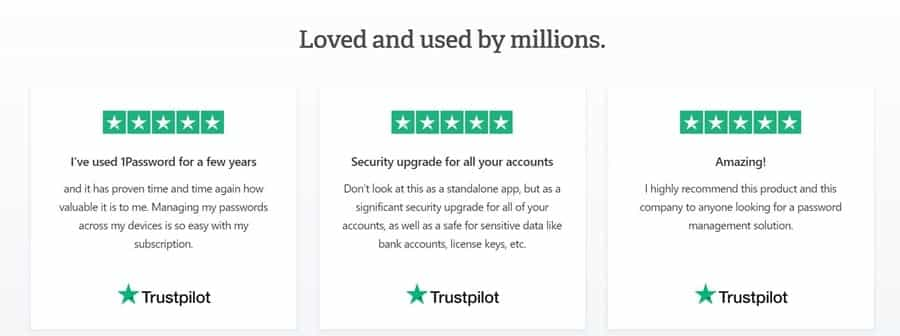
1Password has plenty of positive features. It’s simple to use, and you’re able to store and use strong passwords, logging into sites with a single click.
1Password is primarily an offline desktop management password tool, however it is possible to manually upload all your passwords to the cloud, or to sync them to other devices using Wi-Fi or a USB drive. Of course you’ll find all the same standard features found on all the best password managers. That includes the aforementioned one-click login and autofilling of forms. It also comes with protected privacy settings and alerts for data breaches or online hacking that might have exposed any user accounts.
You’ll find the free service to work great and do exactly what you need in terms of password management. However there are additional features that can be unlocked with the paid version (starting at $2.99/mo) of 1Password.
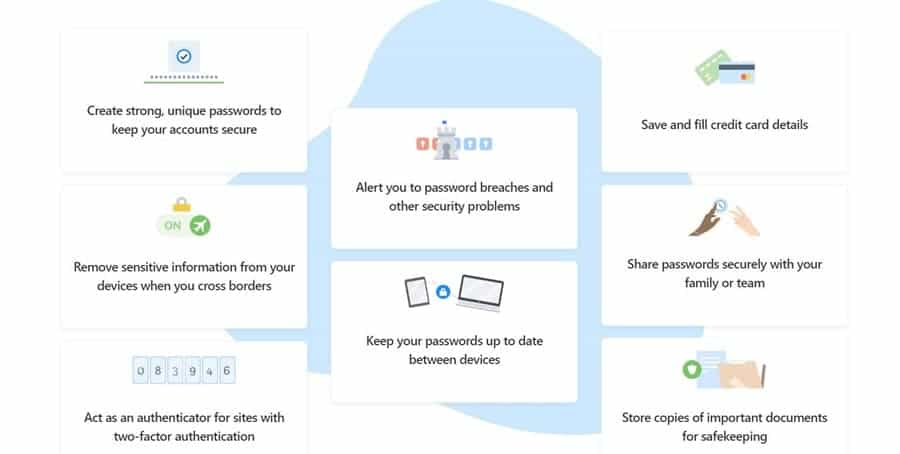
One of these is the family version, which offers password protection for an entire family (up to 5 individuals) for just $4.99/mo. Additional members can be added too for an extra $1/mo. 1Password automatically signs you into each family member’s favorite websites with a single click while protecting valuable passwords, credit cards, and anything else that’s too personal to text or email.
You don’t have to worry about family members snooping into your online accounts either, because each family member gets a personal vault that’s unique and separate from the others.
There are also small business plans that can help to provide security and peace of mind for business owners. These business plans start at $7.99/mo per user, but with the added security from 1Password, their 24/7 customer support, and protection from hacking and online data breaches this fee seems extremely affordable.
Despite all the love given to 1Password there are some complaints about the service. The chief of these is that 1Password doesn’t rely on 2-factor authentication like other password management tools. Instead users need to work a little bit harder.

One example of this is when signing into your 1Password account on a new device. When you do this you’re required to enter the master password for the account and a code that’s sent to a device that you’ve previously used with 1Password. If you don’t have access to that previously used device 1Password instead sends a long, complicated code to get you into your account. It’s not convenient for sure, but it is extremely secure.
Aside from that inconvenience 1Password has you covered. Whatever you need from your password manager is available with 1Password. This applies for individuals, business users, and families. No matter what type of user you are 1Password has your back.
5. RoboForm
If you want the latest, sleek user interface for your password manager, then RoboForm might not be your best choice, however for security and a solid reputation then RoboForm is exactly what you need. RoboForm has always been and remains a versatile password management tool that has powerful built-in features and plug-ins for tons of browsers. And the RoboForm users are unanimous in their loyalty for the product, with some being users for over 2 decades!

You see, RoboForm was one of the first password management tools, released all the way back in 1999, long before cryptocurrencies and blockchain technology were even considered as a means for decentralization of finance.
RoboForm is among the oldest password management tools that are still operational and there’s a very good reason for that. It works just as advertised. Even with all the advancements made in password manager software over the past 2 decades RoboForm remains very true to its roots. It’s made few changes and hasn’t attempted to keep up with current trends. It hasn’t needed to because it was made strong and remains that way, with an extremely loyal user base who wouldn’t even consider switching to one of the newer password management tools.
You see, the key to RoboForm is its simplicity. I can attest to that because I was one of those original users back in 1999. And RoboForm remains so simple and easy to use I still recognize it today. There’s a standalone desktop version, and a premium version (starting at $1.99/mo) that allows for cross-platform functionality.
You’ll find the basic RoboForm premium options are very affordable and come with adequate additional features, including multi-factor authentications and dedicated, priority support from their customer service team––24 hours a day, 7 days a week.
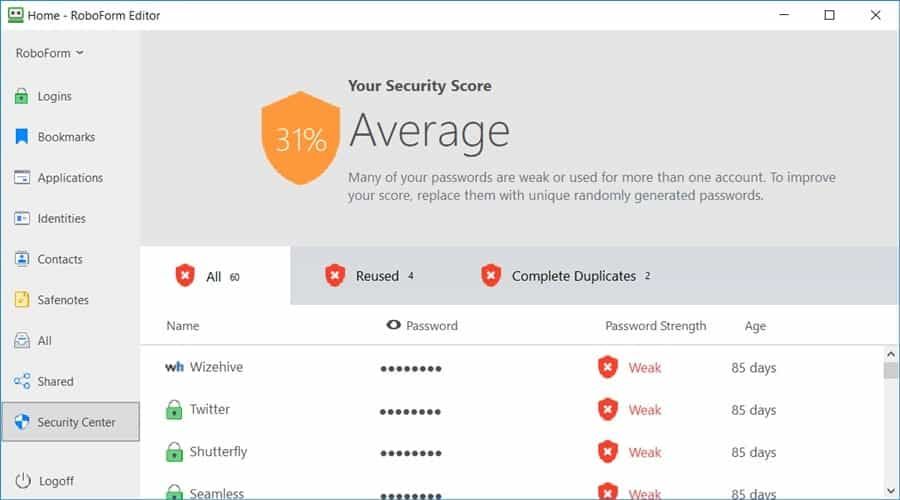
Yes, you could have a modern-looking interface and all the bells and whistles from other password managers, but the simple truth is that RoboForm gets the job done.
6. Bitwarden
Bitwarden gives users enterprise level security in an open-source password management solution. And with support for pretty much any device or browser you’ll never be stuck without access to your Bitwarden account and your passwords. All of this makes Bitwarden one of the most reliable and highly trusted solutions available. Plus it’s easy to use, and it has a tone of features.
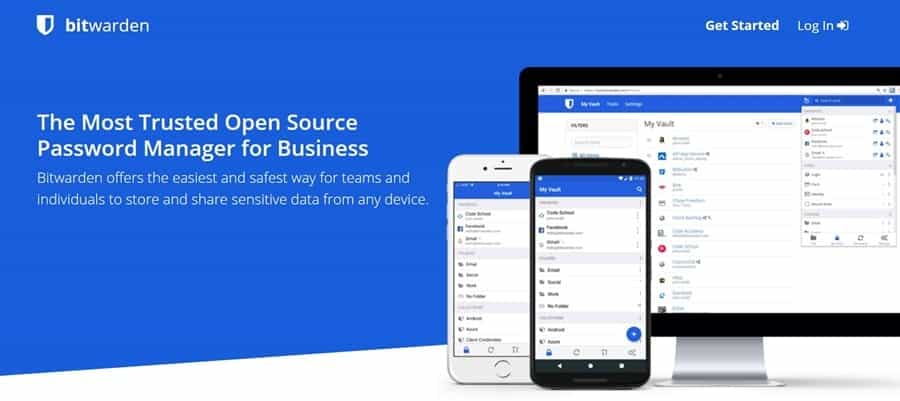
Accessibility is one of the most important priorities for Bitwarden and is definitely delivers. Plus its security remains intact across all the platforms it supports. And it allows for synching across multiple devices for businesses and teams, along with an Admin Password Reset feature.
In addition it also provides unlimited online storage, and the ability to self-host the software and password database. And of course the basic account is always free. Even the premium account starts at under $1 a month ($10/yr). Premium accounts include features like a password health report that will let you know if some of your passwords are too weak, and priority customer support when needed. Of course with the solid attention Bitwarden gives to data encryption and security you won’t be likely to ever need that customer support.

While Bitwarden has a fantastic reputation, and many users appreciate that it is open-source, some of you might want more power than you can get from a free password management tool. However Bitwarden is an excellent choice for those who want a free solution, or for those new to password management software.
Conclusion
That’s six of the best password management tools available in 2021. They all offer free versions if you only need some basic functionality, or upgraded premium versions with enhanced functionality for just a few dollars a month. There’s something for everyone, whether you’re just getting started with password management software, or you’re an expert user.
Now that you know the differences between each of them you should be able to make a better informed decision on which would best suit your needs. If you’re undecided still between two of them we recommend you give the free version of each a try and see.
Disclaimer: These are the writer’s opinions and should not be considered investment advice. Readers should do their own research.
